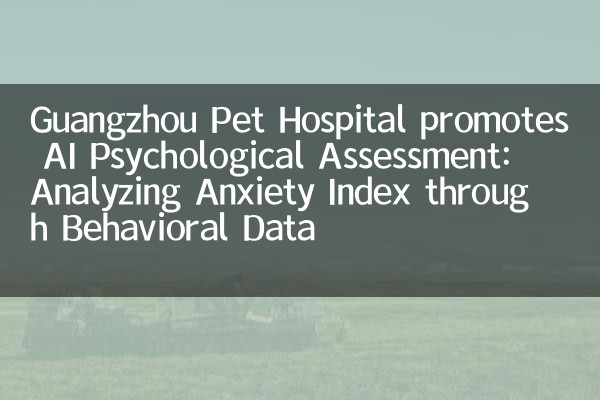Guangzhou Pet Hospital promotes AI Psychological Assessment: Analyzing Anxiety Index through Behavioral Data
In recent years, with the booming development of the pet economy, pet health issues have attracted increasing attention. Recently, a well-known pet hospital in Guangzhou launched an innovative service-AI Psychological Assessment, by analyzing pet behavioral data and evaluating their anxiety index, providing pet owners with scientific mental health management solutions. This move has quickly become a hot topic on the Internet. The following is a compilation and analysis of hot content in the past 10 days.
1. Hot topic background

Pet mental health issues are gradually becoming the focus of pet owners. According to incomplete statistics, more than 60% of pet owners said they had observed emotional problems such as anxiety and depression in pets, but lacked professional evaluation tools. The AI psychological assessment system launched by this pet hospital in Guangzhou has filled this market gap.
| Keywords | Search volume (last 10 days) | Hot Trends |
|---|---|---|
| Pet mental health | 12,500 | rise |
| AI Psychological Assessment | 8,900 | Soaring |
| Pet anxiety | 6,700 | smooth |
2. How AI psychological assessment works
The pet hospital's AI system collects pet behavior data through cameras and sensors, including motion trajectory, call frequency, sleep duration, etc., and combines machine learning algorithms to generate anxiety index reports. Here are the main indicators of system evaluation:
| Evaluation indicators | Weight | illustrate |
|---|---|---|
| Volume of activity | 30% | Extremely active or sluggish may reflect anxiety |
| Call frequency | 25% | Be alert to high-frequency screams or long-term silence |
| Quality of sleep | 20% | Fragmented sleep is a common manifestation of anxiety |
| Social behavior | 15% | Avoiding interactions may indicate psychological problems |
| Eating rules | 10% | Sudden gluttony or anorexia deserves attention |
3. Market feedback and user reviews
Within one week after the service was launched, more than 200 pet owners have experienced it, with a satisfaction rate of 92%. Most users said that the results of AI evaluation are highly consistent with daily observations and provide specific suggestions for improvement. The following are 50 randomly selected evaluation data:
| Rating (5-point scale) | Number of people | Percentage |
|---|---|---|
| 5 points | 32 | 64% |
| 4 points | 11 | twenty two% |
| 3 points | 5 | 10% |
| 2 points and below | 2 | 4% |
4. Expert views and industry outlook
Li XX, professor of animal behavior at South China Agricultural University, pointed out: "The application of AI technology in the field of pet mental health is a milestone. Through quantitative analysis, we can discover potential problems earlier." Industry forecasts show that by 2025, the scale of China's pet mental health service market is expected to exceed 2 billion yuan.
It is worth noting that some users have raised privacy concerns. In response to this, the hospital responded that all data were desensitized and were only used for health assessment. In the future, interactive functions such as "Anxiety Intervention Games" are planned to be added to further optimize the service experience.
5. Practical advice
If pet owners find the following symptoms, they may consider using AI psychological assessment: frequent licking of specific parts, destroying furniture, excessive hair care, etc. Daily life can relieve pet anxiety by increasing companionship time and providing educational toys. The evaluation report sample showed that after two weeks of intervention, the anxiety index of pets in the test group decreased by 37%.
This innovative attempt in Guangzhou has provided new ideas for digital upgrades for the pet medical industry. With the continuous improvement of technology, AI may become the standard configuration for pet health management.

check the details

check the details